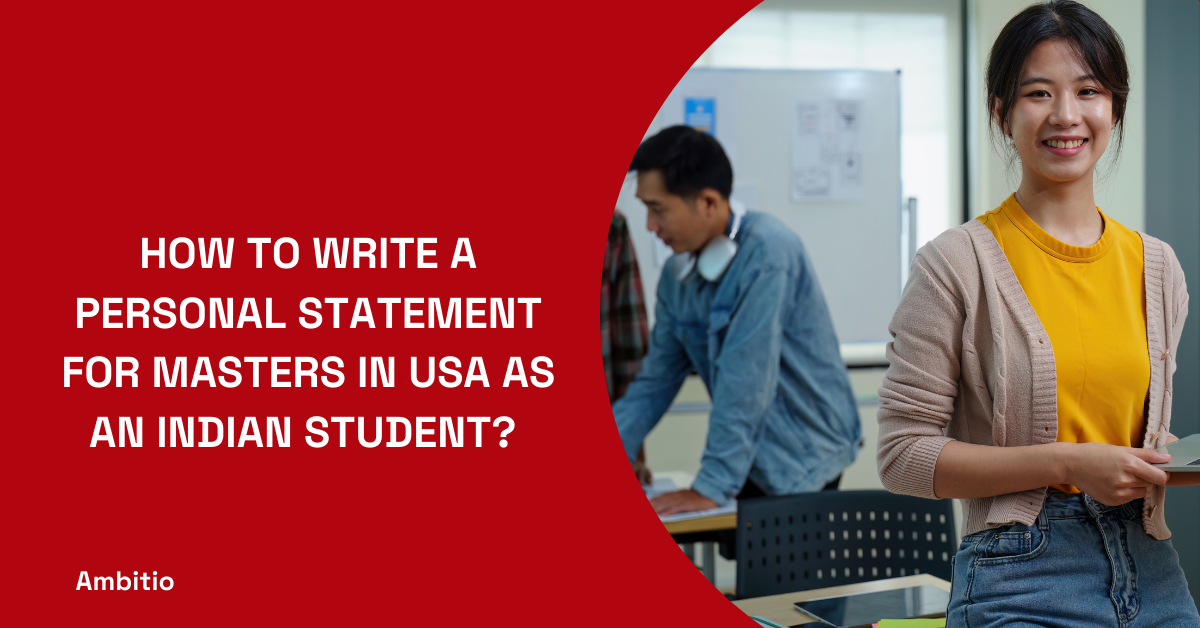13 April 2025
7 minutes read
How To Write A Personal Statement For Masters In USA As An Indian Student? With Examples

Key Takeaways
- Treat your personal statement for masters in USA as your pitch, not your life story
- Make your first paragraph count because most committees skim, not study
- Use real examples to connect your goals with the graduate program’s focus
You probably spent three hours choosing the right font for your resume… but now you’re stuck figuring out how to draft a personal statement without sounding like every other grad school applicant on Earth. And yep—this one page could decide your entire graduate admission. No pressure, right?
I have personally witnessed that most statements of purpose sound like glorified bios with no spark. The admissions committee isn’t impressed by big words or long lists—they want to see academic interests, goals, and why you actually care about the graduate programme. Real impact comes from real clarity, and a voice that feels human, focused, and collaborative.
Why Does A Personal Statement Matter To Study In USA?
I believe your GPA, test scores, and work experience won’t save you if your personal statement reads like a boring LinkedIn bio. Committee members have seen it all. Your job? Stand out, or get buried. And no, throwing in your life story won’t cut it either.

In a system that values individuality, context, and clear purpose, your personal statement should complement rather than duplicate the content of your resume. Think of it as your one shot to show why you—as an international student or maybe even a first-generation college student—belong in that specific program. Here’s why this one page matters more than you think:
1. It Shows You’re More Than Just Numbers
Your academic record is important, sure. But what sets you apart from the crowd is your ability to connect your personal experiences, academic background, and professional experience to your chosen degree. Whether you’re passionate about policy reform or inspired by the Syrian refugee crisis, your personal statement gives committee members context—and that context is powerful.
2. It Connects the Dots for the Admissions Officer
Your statement should complement your other application materials by explaining why you’re applying to this particular graduate program. Use specific examples—maybe a faculty member’s work aligns with your research interests, or the interdisciplinary nature of the degree programs matches your career aspirations. A strong statement is like a map: it shows exactly where you’re going and how their school helps you get there.
3. It Reflects Your Readiness and Communication Skills
Graduate studies demand clarity, focus, and a sense of purpose. The admissions officer reading your statement is asking: “Can this person express complex ideas clearly?” A concise, well-structured, and focused admissions essay proves you’ve got the communication skills, problem-solving mindset, and research skills to thrive. Plus, it signals you took this seriously—huge bonus points.
4. It Tells Them What You’ll Bring to the Table
Graduate school isn’t just about what you’ll gain—it’s also about what you’ll contribute to the academic community. Whether it’s raising awareness through your career in public health, or your plan to bridge the gap between academic and research in your field of interest, your goal is to contribute. Provide examples of impactful experiences, firsthand challenges, or how you overcame obstacles—that’s what hooks them.
How To Write A Personal Statement For Masters In USA?
Every year, over 1 million international students apply to U.S. graduate programs. Out of those, only a fraction receive offers—mostly because their personal statement doesn’t deliver. Applying to graduate school in the U.S. is brutally competitive, and if your opening paragraph doesn’t make the application committee care, you’ve already lost them.

Here’s how to write one that actually works:
1. Nail the Opening Paragraph (Yes, It Matters)
Start with a hook. Not a cliché. Maybe it’s your experience working on social and environmental issues or a moment that shaped your field of interest. If you’re a first-generation college student or an international student, provide examples of how your lived experiences shaped your motivation. A powerful start shows suitability for the chosen degree and grabs the admissions officer’s attention instantly.
2. Be Clear About Your Career Goals
The application committee wants to know what’s next. Are you aiming for a career in public health, policy reform, or academic and research work? Whatever it is, be concise, and connect your career goals directly to the graduate program. The statement should complement your resume by showing where you’re headed and why that specific program is your launchpad.
3. Highlight Relevant Academic and Research Background
Graduate degree programs want to know you’re prepared. Talk about your academic background, research skills, and any research experience that aligns with your field of study. Provide specific examples—e.g., “During my undergrad thesis on the Syrian refugee crisis, I developed strong analytical frameworks…” This demonstrates both understanding of topics and your potential to contribute.
4. Talk About Real-World Experience
Graduate students aren’t expected to have decades of professional experience, but showing relevant work experience or impactful experiences—especially if you’ve overcame obstacles or worked to bridge the gap between theory and practice—makes your application more human. The personal statement should complement rather than duplicate the content of your resume, so keep it focused but personal.
5. Showcase Your Fascination and Fit
This is where you hone in. Why this graduate program? Mention a faculty member whose work matches your research interests. Talk about how the interdisciplinary approach of their degree programs aligns with your field of interest. This level of detail shows suitability, effort, and genuine interest—and that’s exactly what committee members want to see.
6. End With Purpose and Confidence
Your final paragraph should leave zero doubts about your future career path and goal is to contribute. Mention how you’ll contribute to the academic community, what drives your career aspirations, and what impact you want to make. Whether you’re raising awareness, aiming for assistantships, or planning to spark change—own it. A strong statement ends with clarity, not fluff.
2 Strong Personal Statement Examples That Almost Always Work To Get Admission
You need to hone your voice, avoid writing a glorified life story, and understand how others have framed their career goals, research interests, and academic backgrounds in a way that actually gets the application committee to say, “Let’s interview this one.”
Good examples don’t just inspire—they reveal how to develop a strong narrative that connects personal experiences with graduate studies, highlights professional experience and research skills, and aligns perfectly with the specific program. No fluff, no guesswork—just proof of what a strong personal statement really looks like.
Example 1: From First-Generation to Future Public Health Leader
Growing up in a low-income household as a first-generation college student, I saw firsthand how broken healthcare systems widen inequality. That led me to pursue a degree in biology, where I gained research experience studying disease prevention strategies. But I realized I didn’t just want to study the problem—I wanted to fix it.
I’m applying to this particular graduate program in public health because of its focus on social and environmental determinants of health and the work of faculty member Dr. Rao in policy reform. My goal is to contribute to more equitable healthcare models by bridging research with grassroots policy. I’m confident my academic background, professional experience, and career aspirations align with the program’s mission to drive real change.
I believe my personal experiences, especially volunteering in underserved communities, have shaped my drive to act. This strong personal statement reflects how I’ve overcame obstacles, developed communication skills, and built a clear vision for my future career—to create scalable health solutions that reach the people who need them most.
Example 2: Bridging Technology and Humanitarian Crises
During my final year of undergrad, I worked on a research project analyzing how AI could improve refugee aid allocation—specifically during the Syrian refugee crisis. That fascination with tech-driven solutions for global problems shaped my career goals and solidified my desire to pursue graduate studies in data science with a humanitarian lens.
This graduate degree would let me deepen my research skills, learn from top faculty members, and collaborate with peers who share the same field of interest. I’m not just passionate about data—I want to use it to solve real-world issues. My statement should complement my record by showing my commitment to leveraging tech for good.
With a solid mix of academic and research foundation and real-world work experience, I’ve learned how to develop a strong strategy, analyze trends, and adapt solutions under pressure. I’m excited to join a graduate program where I can contribute to the academic community, build on these foundations, and help bridge the gap between innovation and global impact.
Conclusion
At the end of the day, your personal statement is the only part of your application that actually sounds like you. Not your GPA. Not your GMAT or GRE score. Just your words, your intent, your story.
If you’re an Indian student applying to graduate school in the U.S., don’t try to impress—try to connect. That’s what committee members remember. Be honest about your career goals, stay focused on the field of study, and don’t waste space trying to sound perfect. Clarity beats cleverness. Specificity beats style.
Personal statements are just one part of the equation—your entire profile tells the real story. At Ambitio, our AI-powered study abroad experts help you build a standout application that goes beyond grades. No generic templates, no guesswork—just a strategy that proves you’re the right fit.
FAQs
What is an example of a good Masters personal statement?
A good Masters personal statement connects your academic background, relevant experiences, and career goals with the specific program you’re applying to. It showcases your unique perspective and demonstrates why you’re an ideal candidate for that particular program.
How do you write a statement of purpose for a Masters in USA?
Start with a compelling introduction, detail your academic background and relevant experiences, explain why you’ve chosen this specific program, outline your career goals, and conclude by reiterating your fit. Keep it focused, honest, and tailored to each university.
How to start a Masters personal statement?
Begin with an engaging hook that captures attention—perhaps a defining moment that sparked your interest in the field, a relevant professional experience, or a clear statement of your academic passion. This opening should lead naturally into your qualifications and goals.
How to write a personal statement for USA?
Focus on clarity and specificity, highlighting your academic achievements, research experience, and professional goals. Explain why you’re interested in studying in the USA and the specific program. Show how your background has prepared you for success, and proofread thoroughly.
What length should a Masters personal statement be?
Most Masters personal statements should be 500-800 words or 1-2 pages. Some programs have specific length requirements, so always check the application guidelines. Focus on quality over quantity, ensuring every sentence adds value to your application.
How do you make your Masters personal statement stand out?
Make your statement stand out by being specific about your experiences and goals, demonstrating knowledge of the program, sharing a compelling personal narrative, avoiding clichés, and connecting your past achievements with your future aspirations in a clear, authentic way.
When should you start writing your Masters personal statement?
Start writing at least 2-3 months before application deadlines. This gives you sufficient time for research, multiple drafts, feedback from professors or mentors, and final polishing. Beginning early reduces stress and allows for thoughtful reflection on your academic journey.

You can study at top universities worldwide!
Get expert tips and tricks to get into top universities with a free expert session.
Book Your Free 30-Minute Session Now! Book a call now




























